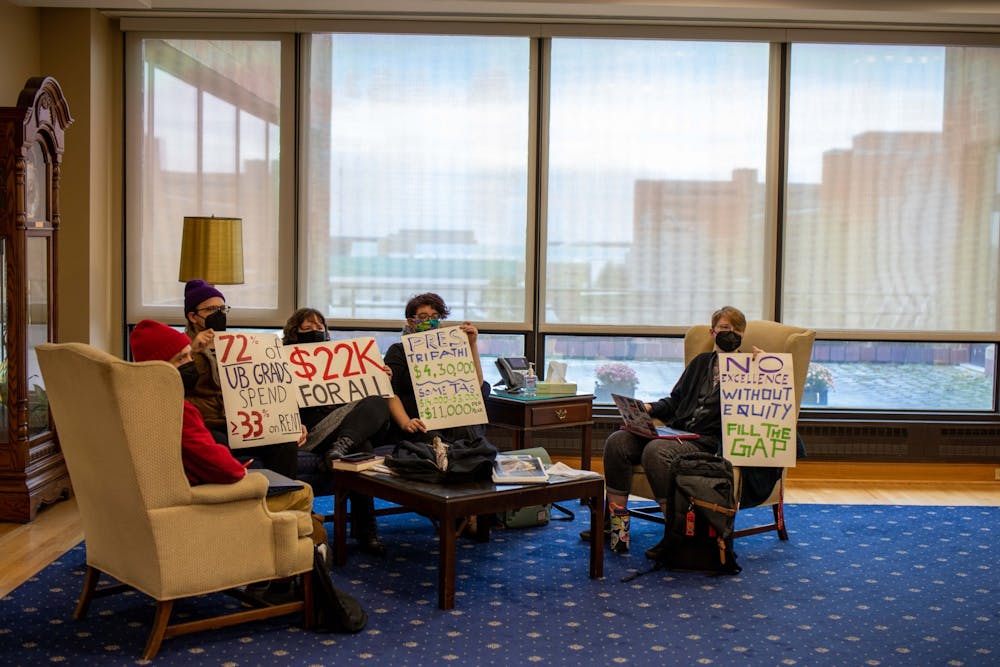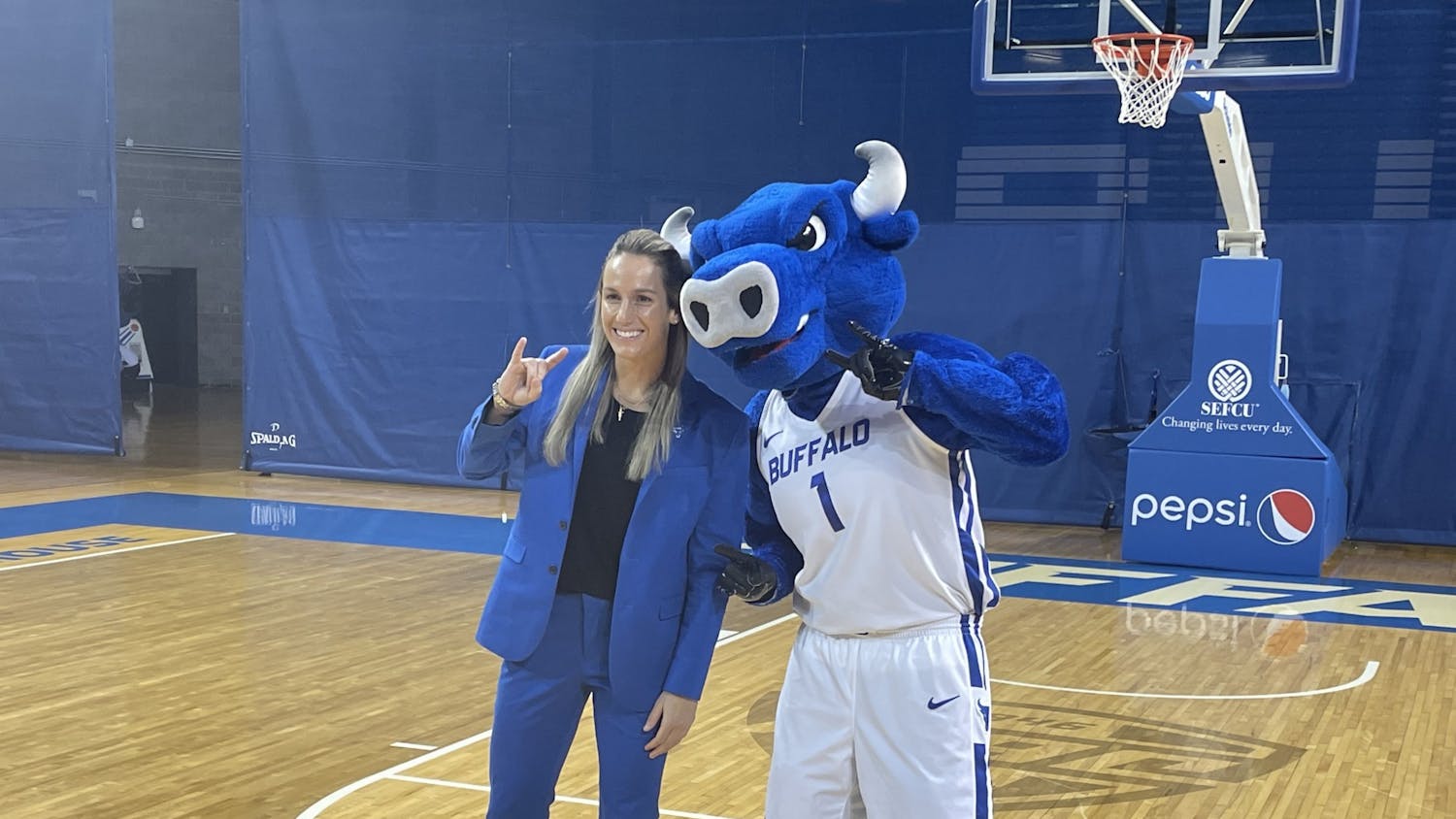The eight graduate students, carrying homemade signs emblazoned with slogans like “$22K for all” and “No excellence without equity,” ascended the bent staircase to UB President Satish Tripathi’s Capen office. They sat down in the cream-colored armchairs in front of the receptionist’s desk, propped their signs up against the furniture, pulled stacks of exams from their backpacks and then started grading them.
The Graduate Student Employee Union, which represents all graduate students who work for the university as teaching assistants or graduate assistants, staged the Dec. 15 “grade-in” to advocate for a $22,000 minimum stipend and the elimination of broad-based fees — which are paid by most students to finance university services like transportation and athletics — for all graduate employees. The grade-in followed the union’s more heavily attended Dec. 2 demonstration and a petition to Tripathi with over 700 signatures that called for said fee abolition and stipend increase.
UB raised the minimum stipend, effectively the annual minimum salary for graduate workers, for all Ph.D. teaching assistants, research assistants and graduate assistants to $20,000 in 2019 and eliminated fees for them last June.
But non-doctoral graduate workers and graduate students working outside of their academic department who aren’t subject to the $20,000 stipend baseline and fee exemption “are getting left out” by that “piecemeal” approach, according to Lawrence Mullen, an English Ph.D. student and business agent for GSEU.
“About one-third of our member base actually is still paying fees and making less than $20,000 because none of these decisions have come from the university president,” they said.
But the university has maintained that GSEU is attempting to bargain with them legally, which only the state is authorized to do.
“The GSEU’s petition clearly demands that the president do something that pertains to a mandatory subject of bargaining,” university spokesperson Kate McKenna said in an email to The Spectrum. “GSEU has presented a bargaining demand, to raise the base compensation (i.e. stipend) for the GSEU membership, a mandatory subject. It is important to understand that neither UB nor President Tripathi are authorized to bargain regarding mandatory subjects… GSEU negotiations occur at the state level.”
But Mullen maintains that this isn’t the case.
“We are urging the president to do something,” they said. “I’m not demanding anything. I’m not bargaining. I’m not negotiating. None of that language is in the petition, so we would like to still meet with the president. And they’ve just continued to push back and say, ‘Nope, you are trying to negotiate. You’re trying to bargain. We won’t meet with you.’”
GSEU leaders plan to advocate for a living wage during their contract negotiations with the state, but they won’t have the opportunity to do so until their current contract expires in July 2023, which “doesn’t provide immediate financial support for graduate workers,” according to Mullen.
“We have members who are still making $12,000 to $13,000 a year and paying fees, so their stipends are coming out, net, to $10,000 to $11,000 before taxes come out,” they said. “So if they were raised to $22,000, I mean, that would be life-changing.”
All full-time fully funded Ph.D. students receive a tuition scholarship, and “many” of those students receive stipends larger than $20,000, McKenna said.
“In addition to UB’s full-time fully funded Ph.D. students, UB also provides opportunities to graduate students who are successfully placed as Teaching Assistants and graduate assistants throughout their graduate careers,” she said. “These graduate students are provided a stipend, health insurance and other benefits that recognize their UB service and commitment to their education.”
But GSEU leaders have argued that that isn’t enough support.
“Many of us are in a grossly vulnerable position with regard to yearly income,” the union’s petition to Tripathi says. “According to the Economic Policy Institute, the cost of living in Erie County is nowhere near $20,000 per year. For a one person-household, the cost of living is $35,000 per year, which is a $15,000+ gap.”
They further contend that the university can afford to increase stipends and waive fees for graduate workers given the $37.8 million in construction costs UB paid for the new One World Café and the nearly $300 million increase in net assets owned by the UB Foundation, the university’s private endowment, as referenced in a GSEU press release from Nov. 30.
McKenna disputes the assertion that the university has poorly spent funds.
“UB is strongly committed to exercising prudent management of its limited university resources to promote resilience, maintain appropriate reserves and operate effectively and efficiently,” McKenna said.
After spending “the entirety of January” trying “to receive COVID-19 guidelines from the university” and “subsequent clarification on those guidelines,” GSEU is “planning on continuing to push for the total elimination of broad-based fees and [the implementation of] a higher stipend baseline during the spring semester,” Mullen said.
Grant Ashley is a senior news/features editor and can be reached at grant.ashley@ubspectrum.com

Grant Ashley is the editor in chief of The Spectrum. He's also reported for NPR, WBFO, WIVB and The Buffalo News. He enjoys taking long bike rides, baking with his parents’ ingredients and recreating Bob Ross paintings in crayon. He can be found on the platform formerly known as Twitter at @Grantrashley.





